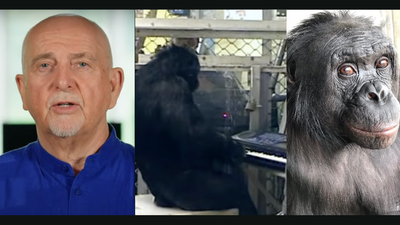
Boing Boing's David Pescovitz on Truman Syndrome and other pitfalls of "lifecasting"
In 1968, Andy Warhol famously forecasted, "In the future, everyone will be… famous for 15 minutes." Of course, he was right. Personal computers and the Web have democratized the tools of media so that most anyone can create and distribute their own content without the need for deep-pocketed middlemen. Can't get on TV? Start your own network. Create your own reality TV show starring you. Flickr already abounds with users who unabashedly post steady streams of self-portraits shot with phonecams held at arm's length, and fans who praise them. And at microblogging hub Twitter, there are thousands of people delighted to share what they're eating for dinner or that they're stuck in traffic, and many thousands more who seem to care.At Institute for the Future, where I'm a researcher, we've been exploring the idea that "everyone will be a channel," and how that experience might inform and change the way we relate to each other, and ourselves. In November, we held a client conference called "Blended Reality" that explored some of those questions. The day after the conference, I read an article about a young man who created his own channel and then killed off the star of the show, namely himself. On November 19, college student Abraham Biggs posted a suicide note to a Web forum he frequented. He then started a Webcam stream on Justin.tv, a platform that makes it easy for anyone to set up a video channel and begin lifecasting, and informed the people in his channel's chat room of his death wish. According to reports, viewers in the chat encouraged Biggs to take the pills that took his life. Eventually, someone watching called the police. When they arrived, almost 200 people were in the room chattering away. Some were LOL'ing, I'm hoping because they thought the whole thing was staged… er, faked."(Online communities) are like the crowd outside the building with the guy on the ledge," Jeffrey Cole, a University of Southern California professor who studies technology's effects on society, told the New York Times. "Sometimes there is someone who gets involved and tries to talk him down. Often the crowd chants, ‘Jump, jump.' They can enable suicide or help prevent it."Now, I'm not saying that lifecasting caused Biggs to kill himself. He was bipolar and under treatment for depression. That said, we don't just make technology. It makes us too. Consider the Truman Syndrome, a psychiatric condition where one is convinced that he is the start of an imaginary reality TV show. Montreal psychiatrists Joel and Ian Gold, who named the condition after the Jim Carrey movie, argue that it might not just be an old-fashioned delusion of grandeur but rather something new spurred by today's media landscape. For example, the researchers reported on one individual who was convinced that his entire life experience, including his psychiatric treatment, was a scripted television drama. Another man visited a federal building to request excusal from his life, which was actually a reality show. Meanwhile, a paper in the Journal of Psychiatry this summer described a 26-year-old Truman Syndrome patient who "had a sense the world was slightly unreal, as if he was the eponymous hero in the film."According to Ian Gold, quoted in an Associated Press article, reality TV and the Web aren't triggering delusions in healthy people, "but at the very least, it seems possible to me that people who would become ill are becoming ill quicker or in a different way."Research psychiatrist Vaughan Bell, who blogs at Mind Hacks, agrees that psychosis must be considered in light of the social context surrounding it. In fact, Bell himself treated a man who believed he was living in The Matrix. (Of course, maybe he was right.)"We can only fully understand or thoughts and behavior, either everyday or pathological, with reference to the cultures we live in," Bell posted. If that's true, then perhaps Bigg's tragic ending and the rise of the Truman Syndrome might be canaries in the coalmine. Could the negative side effects of lifecasting, microblogging, and oversharing online be worse than just an increase in narcissistic behavior?After all, Warhol might have been prescient about the democratization of celebrity but shortsighted on the media that would allow it to happen. In 1996, transmedia artist Nick Philip of Imaginary Foundation created a t-shirt design with a more accurate variation on Warhol: "In the future, everybody will be famous for 15 megabytes."David Pescovitz is co-editor at BoingBoing.net, a research director at Institute for the Future, and editor-at-large for MAKE:
Consider the Truman Syndrome, a psychiatric condition where one is convinced that he is the start of an imaginary reality TV show. Montreal psychiatrists Joel and Ian Gold, who named the condition after the Jim Carrey movie, argue that it might not just be an old-fashioned delusion of grandeur but rather something new spurred by today's media landscape. For example, the researchers reported on one individual who was convinced that his entire life experience, including his psychiatric treatment, was a scripted television drama. Another man visited a federal building to request excusal from his life, which was actually a reality show. Meanwhile, a paper in the Journal of Psychiatry this summer described a 26-year-old Truman Syndrome patient who "had a sense the world was slightly unreal, as if he was the eponymous hero in the film."According to Ian Gold, quoted in an Associated Press article, reality TV and the Web aren't triggering delusions in healthy people, "but at the very least, it seems possible to me that people who would become ill are becoming ill quicker or in a different way."Research psychiatrist Vaughan Bell, who blogs at Mind Hacks, agrees that psychosis must be considered in light of the social context surrounding it. In fact, Bell himself treated a man who believed he was living in The Matrix. (Of course, maybe he was right.)"We can only fully understand or thoughts and behavior, either everyday or pathological, with reference to the cultures we live in," Bell posted. If that's true, then perhaps Bigg's tragic ending and the rise of the Truman Syndrome might be canaries in the coalmine. Could the negative side effects of lifecasting, microblogging, and oversharing online be worse than just an increase in narcissistic behavior?After all, Warhol might have been prescient about the democratization of celebrity but shortsighted on the media that would allow it to happen. In 1996, transmedia artist Nick Philip of Imaginary Foundation created a t-shirt design with a more accurate variation on Warhol: "In the future, everybody will be famous for 15 megabytes."David Pescovitz is co-editor at BoingBoing.net, a research director at Institute for the Future, and editor-at-large for MAKE:












